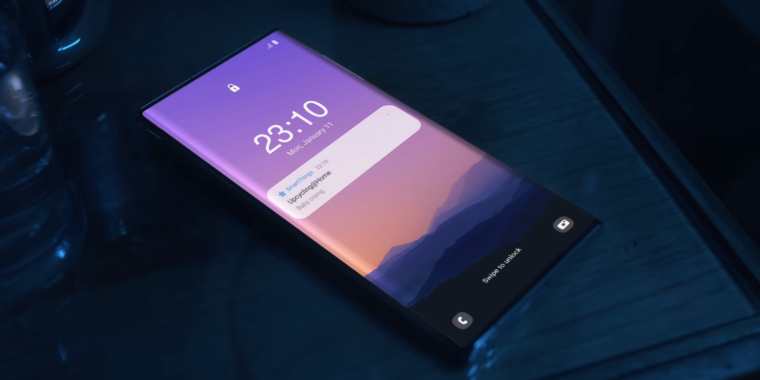
-
Samsung's upcycling program can turn an old smartphone into an audio baby monitor.
-
Oh no! The baby is crying.
-
The monitor can alert your other, newer Samsung phones.
-
This one is a light sensor.
-
It's sundown, so it turns the lights on. Fido doesn't have to sit in the dark.
Samsung on Wednesday kicked off something genuinely innovative in the smartphone market: an official consumer upcycling program. Samsung's "Galaxy Upcycling at Home" initiative was announced at CES 2021, and today it enters a "beta" release. The program allows users to transform old phones into smart home devices that work through Samsung's SmartThings app, which has two new modes: a sound sensor and a light sensor.
Samsung says the sound sensor mode will "accurately distinguish sounds in everyday surroundings, and users can choose to save certain sound recordings. For example, if the device detects sounds such as a baby crying, dog barking, cat meowing, or a knock, it will send an alert directly to the user’s smartphone, and the user can listen to the recorded sound." Samsung says the mode is meant to act as a baby monitor or pet care solution.
The Light Sensor mode simply turns your phone into a light sensor, allowing it to detect levels of sunlight or room light and trigger your smart home to do something in response. If you want to use this mode while on battery power, Samsung says it has "equipped the Galaxy Upcycling at Home upgrade with battery optimization solutions to minimize battery usage."
Samsung says the Upcycling at Home feature is "available on all S, Note, and Z series released from 2018 (S9, Note9 or later) running Android 9 and above. More devices will be supported in the future." For now, the country support is limited to the US, UK, and Korea.
Samsung's upcycling program marks a very modest starting point, and the company could do a lot more if it wants to limit e-waste and make old devices useful. So far, the program only uses the microphones and light sensors on old devices, but the most common still-useful feature of an old smartphone is the camera. Turning an old phone into an IP camera is a popular way to reuse devices (with apps like Alfred, Haven, and IP Webcam), but Samsung hasn't explored that area yet.
It would also be nice if Samsung just threw open the doors to its end-of-life hardware and unlocked the bootloaders, allowing users to wipe out the old abandoned OSes and apps on these devices and install some newer, more appropriate software. Running a full smartphone OS on a single-use device is wildly overkill, and you could have better performance and longer battery life (if you're running on the battery) if you wiped out most of the default software.
Even years-old smartphones could be very capable devices if they weren't so locked down. Consider the myriad uses of an open device like a Raspberry Pi, which is still slower than even a five-year-old smartphone. For now, we're just getting a few smart home apps, but let's hope for more hardware access in the future.
Listing image by Samsung
The Link LonkApril 21, 2021 at 11:23PM
https://ift.tt/3gszZIt
Samsung starts official smartphone upcycling program - Ars Technica
https://ift.tt/31VSHRH
Samsung
No comments:
Post a Comment